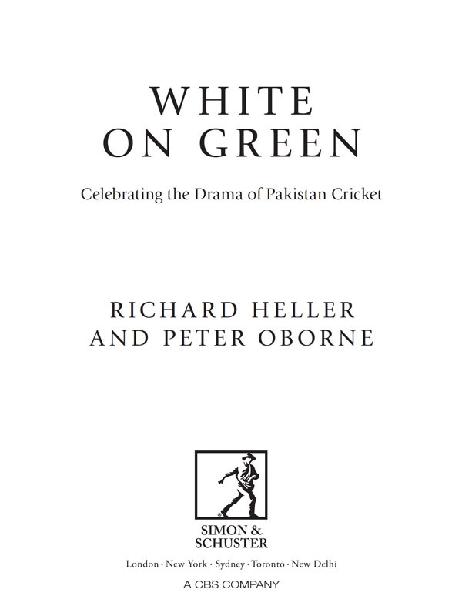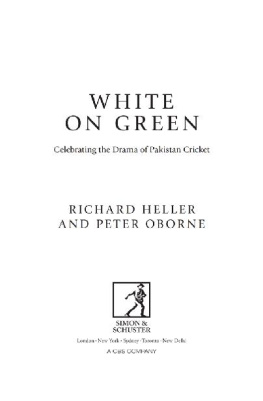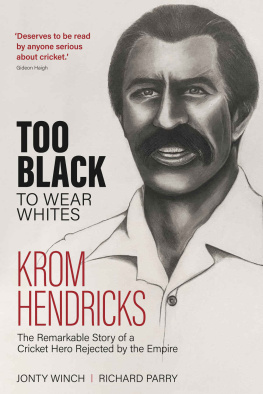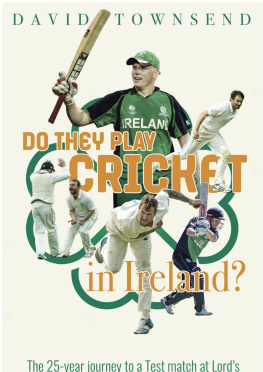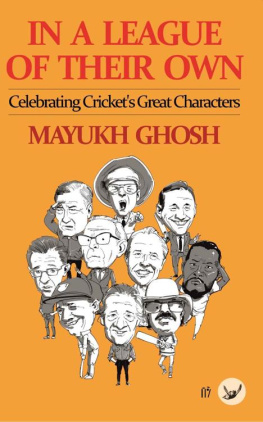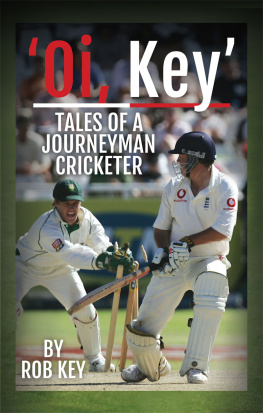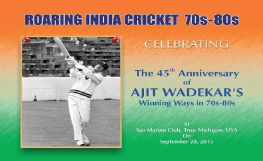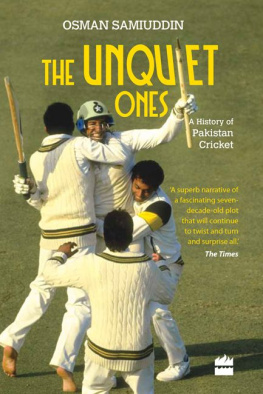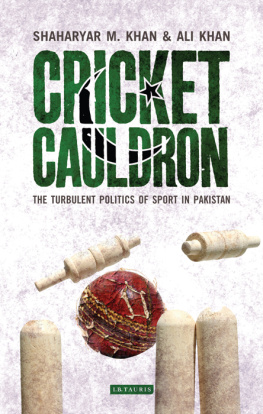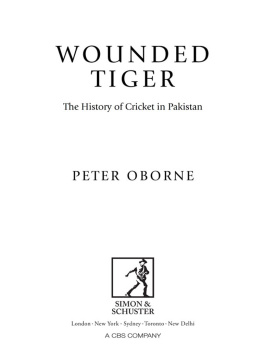Thank you for downloading this Simon & Schuster ebook.
Join our mailing list to get updates on new releases, deals, recommended reads, and more from Simon & Schuster.
CLICK HERE TO SIGN UP
Already a subscriber? Provide your email again so we can register this ebook and send you more of what you like to read. You will continue to receive exclusive offers in your inbox.
WHITE
ON GREEN
Also by Peter Oborne:
Wounded Tiger: A History of Cricket in Pakistan
Basil DOliveira: Cricket and Conspiracy The Untold Story
(with David Morrison) A Dangerous Delusion: Why the West is Wrong about Nuclear Iran
The Rise of Political Lying
The Triumph of the Political Class
Not the Chilcot Report
Also by Richard Heller:
A Tale of Ten Wickets
The Network
First published in Great Britain by Simon & Schuster UK Ltd, 2016
A CBS COMPANY
Copyright 2016 by Richard Heller and Peter Oborne
This book is copyright under the Berne convention.
No reproduction without permission.
All rights reserved.
The right of Richard Heller and Peter Oborne to be identified as the authors of this work has been asserted by them in accordance with sections 77 and 78 of the Copyright, Designs and Patents Act, 1988.
Simon & Schuster UK Ltd
1st Floor
222 Grays Inn Road
London WC1X 8HB
www.simonandschuster.co.uk
Simon & Schuster Australia, Sydney
Simon & Schuster India, New Delhi
The author and publishers have made all reasonable efforts to contact copyright-holders for permission, and apologise for any omissions or errors in the form of credits given. Corrections may be made to future printings.
A CIP catalogue record for this book is available from the British Library.
ISBN: 978-1-4711-5641-0
Ebook ISBN: 978-1-4711-5643-4
Typeset in Garamond by M Rules
Simon & Schuster UK Ltd are committed to sourcing paper that is made from wood grown in sustainable forests and support the Forest Stewardship Council, the leading international forest certification organisation. Our books displaying the FSC logo are printed on FSC certified paper.
To the memory of Liz and Lindsay
and to both Felixes, Giles, Tom and Rupert,
and to all the amazing cricket players
and cricket lovers in Pakistan
Contents
Acknowledgements
T his book would have been impossible without the unstinting help of many others, especially in Pakistan. However, we are especially indebted to two people.
Qamar Ahmed is based in Karachi when not pursuing his trade as doyen of the worlds cricket reporters. In 2014, he followed Richie Benaud and John Woodcock (of The Times of London) into the highly select club of people who have reported 400 Test matches. His reporting career began at Lords in 1974 (a controversial rain-hit Test between England and Pakistan). At the time of writing, he had covered 418, in both print and broadcast media, including the BBC. To put this figure in perspective, this is more Test matches than Pakistan have ever played, and constitutes nearly 20 per cent of all the Test matches in cricket history. To this total can be added 732 one-day internationals. It is hard to imagine that anyone else could have seen, let alone recorded, such a high proportion of the history of any sport.
In a country whose media are often partisan, Qamar has stood out as a journalist of integrity. A graduate in English literature from Sindh University in Hyderabad, he can express himself equally forcefully in English as in Urdu, but he has never allowed any personal or factional agenda to influence his output. He has earned the trust of generations of Pakistan cricketers and for that reason was instrumental in securing many of the interviews in this book: we are especially indebted to him for those of Misbah-ul-Haq and Younus Khan.
Qamars cricket memories reach back into the 1950s, when he had a successful career in Pakistans domestic cricket as a slow left-arm bowler. He was the only bowler to dismiss each of the five Mohammad brothers in first-class cricket: Wazir, Raees, Hanif, Mushtaq and Sadiq. He was close to Test selection, but as with so many other Pakistan players he was a victim of caprice. For many years after, he produced match-winning performances for club and media teams. One cricket skill is still with him, in his 79th year. He is an excellent judge of a sharp single, invariably giving a decisive call to his partner at the right moment to cross a busy street in Karachi. Outside of cricket, Qamar appreciates literature and bon mots. He is as generous to other peoples as to his own. When he has the time he is a brilliant cook, and he is a generous supplier of wondrous mangoes from his familys farm.
In Lahore, Najum Latif made a similar contribution to this book. On his own initiative he secured a groundbreaking interview with Dr AQ Khan, and we are grateful to him for the opportunity to publish the greater part of this. Najum also secured many interviews for us from his own long list of contacts within Pakistan cricket where he has earned their respect, trust and friendship. We were especially pleased that these included Israr Ali, Pakistans oldest surviving Test cricketer a quest which lasted over two years. Sadly, Israr Ali died as this book was being prepared: our interview was the last he ever gave.
Although a back injury ended his promising career as a seam bowler, Najum made lasting friendships at school and college with many eminent cricketers, particularly Saeed Ahmed and the late MK Mantri of India. He has become not only a distinguished historian of Pakistan cricket but, even more importantly, one of its conservators. He founded and still curates Pakistans first (and still only) cricket museum at the Lahore Gymkhana club and has set down the oral memories of many great Pakistan cricketers, being especially close to Fazal Mahmood in his final years. Apart from cricket, he has been a conservator of wildlife. He raised wolves with his daughter at Sahiwal and adopted lions and tigers at Lahore Zoo, one of many organisations for whom he puts in countless unpaid hours as a writer and administrator. He is equally at home with films and books as with cricket.
Mueen Afzal was a wonderful host in Lahore and Sharjah. After a distinguished career in public service, academia and private business he is an especially informed devotee of Pakistan cricket and observer of its administration under different governments. He was a rich source of memory and analysis, and we thank him particularly for his profile of his long-time friend Shaharyar Khan.
Arif Abbasi supplied us with a wealth of detail on Pakistan cricket, and often pungent analysis of its problems, past and present. In three separate spells of high office in its administration, he was instrumental in modernising its finances, improving and extending its infrastructure and raising its international profile, particularly in the organisation of two World Cups. We look forward to the imminent publication of his own memoirs, entitled Inside Outside , in Pakistan. Arif was a rare supporter of womens cricket in a difficult era, and we are especially grateful to him for introducing us to the amazing Khan sisters.
Afzal Ahmed in Karachi was indispensable to us, with his extraordinary eye for detail. He not only weeded out many errors in the manuscript but also supplied many positive suggestions of his own, together with rare archive material from his personal collection.
